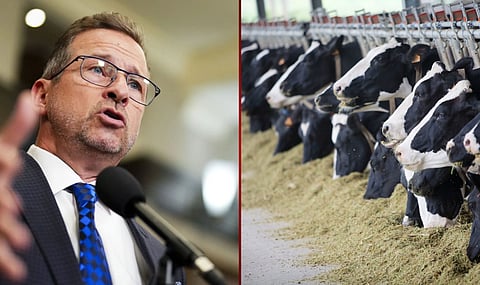

Choose your descriptor — stupidity, hypocrisy, manipulation, or something else — there’s no shortage of words to describe the latest House of Commons legislation that excludes the national dairy cartel from future free trade agreements. A total of 262 MPs voted in favour of the bill, including Pierre Poilievre and 56 members of his Conservative party.
Not quite the unanimous vote for the Canada Health Act back in the 1960s, but with far more urgent short-term consequences.
This legislation entrenches control over the supply of dairy, poultry, and eggs through production quotas, import restrictions, and price-fixing. It claims to ensure fair prices for producers and food security for consumers. In practice, it maintains an archaic regime of federal and provincial marketing boards — the antithesis of consumer choice, variety, and economic freedom.
By directly limiting both internal and external competition, the act is the very opposite of free trade. MPs, eager to please Quebec — the country’s dairy stronghold — have placed upcoming U.S. trade and tariff negotiations at unnecessary risk.
Parliament once again yields to Quebec’s demands. The interests of the rest of Canada be damned.
Does this matter? Canada’s economy is based on trade. It shapes its prosperity, job market, and overall standard of living. The benefits of trade are revealed in economic growth, job creation, consumer choice, specialization, resilience and global reputation.
Yet once again, the lust for power has confirmed what many Canadians already suspect: Quebec enjoys a higher grade of citizenship. Bloc Québécois leader Yves-François Blanchet wasn’t wrong when he called Canada an “artificial country.”
The timing could hardly have been worse. Just weeks after Ottawa dropped its ill-fated Digital Services Tax under pressure from President Trump, Parliament has now dropped another irritant into an already fraught trading relationship. Trump — no fan of Canada’s dairy cartel — believed it had been dismantled under the USMCA. He will not miss the hypocrisy.
Wasn’t it only a few months ago that Premier Danielle Smith was criticized for opposing potential tariffs on oil exports — accused of disloyalty to “Team Canada”?
Where are the Team Canada boo-birds now?
Liberal strategists know their electoral future depends on Quebec. That’s how Quebec received over $13 billion in equalization payments last year while simultaneously opposing the federally regulated pipelines that are the source of much of it. Secure in its political leverage, Quebec feels free to bite the hand that feeds it.
Apparently, Pierre Poilievre has also taken the hint. His support for this legislation risks undermining future U.S. negotiations and could cost him in the upcoming Alberta by-election. It will certainly deepen resentment in Saskatchewan and Alberta.
Trump, thin-skinned as ever, may interpret this as a rebuke — and retaliate with tariffs. The legislation also underscores the reality many Westerners already feel: Canada’s power structure serves Quebec’s interests, sustains Liberal dominance, and routinely disregards the economic health, dignity, and democratic inclusion of the West — at a time of both external threats and internal division.
A mea culpa: In the past, I’ve referred to Westerners who accept this status quo as “second stringers.” That was generous. Favoured citizenship belongs to Quebecers, ordinary citizenship to Ontarians, and third-class status to those at either end of the country. “Third stringers” is the more accurate label — for those sidelined while others call the plays.
These citizens often still refer to themselves as “patriots.” But centuries ago, British satirist Samuel Johnson said that “patriotism is the last refuge of the scoundrel.” More than ever, that holds true today.
Westerners who stand for self-determination honour the pioneers who fled repressive regimes to build lives of freedom on the prairies. We owe it to them — and to ourselves — to act with the same courage now. To ignore or excuse legislation like this is not patriotism. It is disinterest. It is resignation. It is scoundrelry of the third order.
If “repression” sounds too strong, ask the truckers who drove to Ottawa seeking a meeting with the Prime Minister — only for him to flee to the Laurentians and declare an emergency. Credit cards cancelled, bank accounts frozen — law-abiding depositors denied their own money. Repressive, indeed.
You’re not alone if you moved assets to Western institutions after that moment. Trust, once broken, is hard to restore.
So, is there a better — or worse — example of why Canada’s power structure must broaden? Or, more regrettably, why independence is fast becoming the only solution?
It’s time, fellow third-stringers — elbows up for Ottawa.
